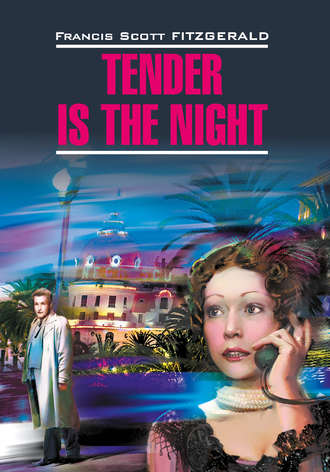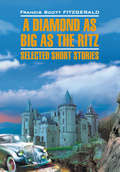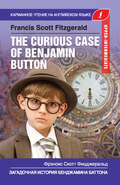
Фрэнсис Скотт Фицджеральд
Tender is the night / Ночь нежна. Книга для чтения на английском языке
XIII
Dick turned the corner of the traverse and continued along the trench walking on the duckboard. He came to a periscope, looked through it a moment; then he got up on the step and peered over the parapet. In front of him beneath a dingy sky was Beaumont Hamel; to his left the tragic hill of Thiepval[109]. Dick stared at them through his field glasses, his throat straining with sadness.
He went on along the trench, and found the others waiting for him in the next traverse. He was full of excitement and he wanted to communicate it to them, to make them understand about this, though actually Abe North had seen battle service and he had not.
“This land here cost twenty lives a foot that summer,” he said to Rosemary. She looked out obediently at the rather bare green plain with its low trees of six years’ growth. If Dick had added that they were now being shelled she would have believed him that afternoon. Her love had reached a point where now at last she was beginning to be unhappy, to be desperate. She didn’t know what to do – she wanted to talk to her mother.
“There are lots of people dead since and we’ll all be dead soon,” said Abe consolingly.
Rosemary waited tensely for Dick to continue.
“See that little stream – we could walk to it in two minutes. It took the British a month to walk to it – a whole empire walking very slowly, dying in front and pushing forward behind. And another empire walked very slowly backward a few inches a day, leaving the dead like a million bloody rugs. No Europeans will ever do that again in this generation.”
“Why, they’ve only just quit over in Turkey,” said Abe. “And in Morocco —”
“That’s different. This western-front business couldn’t be done again, not for a long time. The young men think they could do it but they couldn’t. They could fight the first Marne[110] again but not this. This took religion and years of plenty and tremendous sureties and the exact relation that existed between the classes. The Russians and Italians weren’t any good on this front. You had to have a whole-souled sentimental equipment going back further than you could remember. You had to remember Christmas, and postcards of the Crown Prince[111] and his fiancée, and little cafés in Valence[112] and beer gardens in Unter den Lindenand[113] weddings at the mairie[114], and going to the Derby, and your grandfather’s whiskers.”
“General Grant[115] invented this kind of battle at Petersburg in sixty-five.”
“No, he didn’t – he just invented mass butchery. This kind of battle was invented by Lewis Carroll and Jules Verne and whoever wrote Undine[116], and country deacons bowling and marraines[117] in Marseilles and girls seduced in the back lanes of Wurtemburg and Westphalia[118]. Why, this was a love battle – there was a century of middle-class love spent here. This was the last love battle.”
“You want to hand over this battle to D. H. Lawrence[119],” said Abe.
“All my beautiful lovely safe world blew itself up here with a great gust of high explosive love,” Dick mourned persistently. “Isn’t that true, Rosemary?”
“I don’t know,” she answered with a grave face. “You know everything.”
They dropped behind the others. Suddenly a shower of earth gobs and pebbles came down on them and Abe yelled from the next traverse:
“The war spirit’s getting into me again. I have a hundred years of Ohio love behind me and I’m going to bomb out this trench.” His head popped up over the embankment. “You’re dead – don’t you know the rules? That was a grenade.”
Rosemary laughed and Dick picked up a retaliatory handful of stones and then put them down.
“I couldn’t kid here,” he said rather apologetically. “The silver cord is cut and the golden bowl is broken[120] and all that, but an old romantic like me can’t do anything about it.”
“I’m romantic too.”
They came out of the neat restored trench, and faced a memorial to the Newfoundland dead. Reading the inscription Rosemary burst into sudden tears. Like most women she liked to be told how she should feel, and she liked Dick’s telling her which things were ludicrous and which things were sad. But most of all she wanted him to know how she loved him, now that the fact was upsetting everything, now that she was walking over the battle-field in a thrilling dream.
After that they got in their car and started back toward Amiens[121]. A thin warm rain was falling on the new scrubby woods and underbrush and they passed great funeral pyres of sorted duds, shells, bombs, grenades, and equipment, helmets, bayonets, gun stocks and rotten leather, abandoned six years in the ground. And suddenly around a bend the white caps of a great sea of graves. Dick asked the chauffeur to stop.
“There’s that girl – and she still has her wreath.”
They watched as he got out and went over to the girl, who stood uncertainly by the gate with a wreath in her hand. Her taxi waited. She was a redhaired girl from Tennessee whom they had met on the train this morning, come from Knoxville[122] to lay a memorial on her brother’s grave. There were tears of vexation on her face.
“The War Department must have given me the wrong number,” she whimpered. “It had another name on it. I been lookin’ for it since two o’clock, and there’s so many graves.”
“Then if I were you I’d just lay it on any grave without looking at the name,” Dick advised her.
“You reckon that’s what I ought to do?”
“I think that’s what he’d have wanted you to do.” It was growing dark and the rain was coming down harder. She left the wreath on the first grave inside the gate, and accepted Dick’s suggestion that she dismiss her taxi-cab and ride back to Amiens with them.
Rosemary shed tears again when she heard of the mishap – altogether it had been a watery day, but she felt that she had learned something, though exactly what it was she did not know. Later she remembered all the hours of the afternoon as happy – one of those uneventful times that seem at the moment only a link between past and future pleasure but turn out to have been the pleasure itself.
Amiens was an echoing purple town, still sad with the war, as some railroad stations were: – the Gare du Nord and Waterloo station[123] in London. In the daytime one is deflated by such towns, with their little trolley cars of twenty years ago crossing the great gray cobble-stoned squares in front of the cathedral, and the very weather seems to have a quality of the past, faded weather like that of old photographs. But after dark all that is most satisfactory in French life swims back into the picture – the sprightly tarts, the men arguing with a hundred Voilàs[124] in the cafés, the couples drifting, head to head, toward the satisfactory inexpensiveness of nowhere. Waiting for the train they sat in a big arcade, tall enough to release the smoke and chatter and music upward and obligingly the orchestra launched into “Yes, We Have No Bananas,” – they clapped, because the leader looked so pleased with himself. The Tennessee girl forgot her sorrow and enjoyed herself, even began flirtations of tropical eye-rollings and pawings, with Dick and Abe. They teased her gently.
Then, leaving infinitesimal sections of Wurtemburgers, Prussian Guards, Chasseurs Alpins[125], Manchester mill hands and old Etonians[126] to pursue their eternal dissolution under the warm rain, they took the train for Paris. They ate sandwiches of mortadel sausage and bel paese cheese[127] made up in the station restaurant, and drank Beaujolais[128].
Nicole was abstracted, biting her lip restlessly and reading over the guide-books to the battlefield that Dick had brought along – indeed, he had made a quick study of the whole affair, simplifying it always until it bore a faint resemblance to one of his own parties.
XIV
When they reached Paris Nicole was too tired to go on to the grand illumination at the Decorative Art Exposition as they had planned. They left her at the Hotel Roi George[129], and as she disappeared between the intersecting planes made by lobby lights of the glass doors, Rosemary’s oppression lifted. Nicole was a force – not necessarily well disposed or predictable like her mother – an incalculable force. Rosemary was somewhat afraid of her.
At eleven she sat with Dick and the Norths at a houseboat café just opened on the Seine. The river shimmered with lights from the bridges and cradled many cold moons. On Sundays sometimes when Rosemary and her mother had lived in Paris they had taken the little steamer up to Suresnes and talked about plans for the future. They had little money but Mrs. Speers was so sure of Rosemary’s beauty and had implanted in her so much ambition, that she was willing to gamble the money on “advantages”; Rosemary in turn was to repay her mother when she got her start…
Since reaching Paris Abe North had had a thin vinous fur over him; his eyes were bloodshot from sun and wine. Rosemary realized for the first time that he was always stopping in places to get a drink, and she wondered how Mary North liked it. Mary was quiet, so quiet save for her frequent laughter that Rosemary had learned little about her. She liked the straight dark hair brushed back until it met some sort of natural cascade that took care of it – from time to time it eased with a jaunty slant over the corner of her temple, until it was almost in her eye when she tossed her head and caused it to fall sleek into place once more.
“We’ll turn in early to-night[130], Abe, after this drink.” Mary’s voice was light but it held a little flicker of anxiety. “You don’t want to be poured on the boat.”
“It’s pretty late now,” Dick said. “We’d all better go.”
The noble dignity of Abe’s face took on a certain stubbornness, and he remarked with determination:
“Oh, no.” He paused gravely. “Oh, no, not yet. We’ll have another bottle of champagne.”
“No more for me,” said Dick.
“It’s Rosemary I’m thinking of. She’s a natural alcoholic – keeps a bottle of gin in the bathroom and all that – her mother told me.”
He emptied what was left of the first bottle into Rosemary’s glass. She had made herself quite sick the first day in Paris with quarts of lemonade; after that she had taken nothing with them, but now she raised the champagne and drank at it.
“But what’s this?” exclaimed Dick. “You told me you didn’t drink.”
“I didn’t say I was never going to.”
“What about your mother?”
“I’m just going to drink this one glass.” She felt some necessity for it. Dick drank, not too much, but he drank, and perhaps it would bring her closer to him, be a part of the equipment for what she had to do. She drank it quickly, choked and then said, “Besides, yesterday was my birthday – I was eighteen.”
“Why didn’t you tell us?” they said indignantly.
“I knew you’d make a fuss over it and go to a lot of trouble.” She finished the champagne. “So this is the celebration.”
“It most certainly is not,” Dick assured her. “The dinner to-morrow night is your birthday party and don’t forget it. Eighteen – why that’s a terribly important age.”
“I used to think until you’re eighteen nothing matters,” said Mary.
“That’s right,” Abe agreed. “And afterward it’s the same way.”
“Abe feels that nothing matters till he gets on the boat,” said Mary. “This time he really has got everything planned out when he gets to New York.” She spoke as though she were tired of saying things that no longer had a meaning for her, as if in reality the course that she and her husband followed, or failed to follow, had become merely an intention.
“He’ll be writing music in America and I’ll be working at singing in Munich, so when we get together again there’ll be nothing we can’t do.”
“Thats wonderful,” agreed Rosemary, feeling the champagne.
“Meanwhile, another touch of champagne for Rosemary. Then she’ll be more able to rationalize the acts of her lymphatic glands. They only begin to function at eighteen.”
Dick laughed indulgently at Abe, whom he loved, and in whom he had long lost hope: “That’s medically incorrect and we’re going.” Catching the faint patronage Abe said lightly:
“Something tells me I’ll have a new score on Broadway long before you’ve finished your scientific treatise.”
“I hope so,” said Dick evenly. “I hope so. I may even abandon what you call my ’scientific treatise’.“
“Oh, Dick!” Mary’s voice was startled, was shocked. Rosemary had never before seen Dick’s face utterly expressionless; she felt that this announcement was something momentous and she was inclined to exclaim with Mary “Oh, Dick!”
But suddenly Dick laughed again, added to his remark “ – abandon it for another one,” and got up from the table.
“But Dick, sit down. I want to know —”
“I’ll tell you some time. Good night, Abe. Good night, Mary.”
“Good night, dear Dick.” Mary smiled as if she were going to be perfectly happy sitting there on the almost deserted boat. She was a brave, hopeful woman and she was following her husband somewhere, changing herself to this kind of person or that, without being able to lead him a step out of his path, and sometimes realizing with discouragement how deep in him the guarded secret of her direction lay. And yet an air of luck clung about her, as if she were a sort of token…
XV
“What is it you are giving up?” demanded Rosemary, facing Dick earnestly in the taxi.
“Nothing of importance.”
“Are you a scientist?”
“I’m a doctor of medicine.”
“Oh-h!” she smiled delightedly. “My father was a doctor too. Then why don’t you —” she stopped.
“There’s no mystery. I didn’t disgrace myself at the height of my career, and hide away on the Riviera. I’m just not practising. You can’t tell, I’ll probably practise again some day.”
Rosemary put up her face quietly to be kissed. He looked at her for a moment as if he didn’t understand. Then holding her in the hollow of his arm he rubbed his cheek against her cheek’s softness, and then looked down at her for another long moment.
“Such a lovely child,” he said gravely.
She smiled up at him; her hands playing conventionally with the lapels of his coat. “I’m in love with you and Nicole. Actually that’s my secret – I can’t even talk about you to anybody because I don’t want any more people to know how wonderful you are. Honestly – I love you and Nicole – I do.”
– So many times he had heard this – even the formula was the same.
Suddenly she came toward him, her youth vanishing as she passed inside the focus of his eyes and he had kissed her breathlessly as if she were any age at all. Then she lay back against his arm and sighed.
“I’ve decided to give you up,” she said.
Dick started – had he said anything to imply that she possessed any part of him?
“But that’s very mean,” he managed to say lightly, “just when I was getting interested.”
“I’ve loved you so —” As if it had been for years. She was weeping a little now. “I’ve loved you soo-o.”
Then he should have laughed, but he heard himself saying, “Not only are you beautiful but you are somehow on the grand scale. Everything you do, like pretending to be in love or pretending to be shy gets across.”
In the dark cave of the taxi, fragrant with the perfume Rosemary had bought with Nicole, she came close again, clinging to him. He kissed her without enjoying it. He knew that there was passion there, but there was no shadow of it in her eyes or on her mouth; there was a faint spray of champagne on her breath. She clung nearer desperately and once more he kissed her and was chilled by the innocence of her kiss, by the glance that at the moment of contact looked beyond him out into the darkness of the night, the darkness of the world. She did not know yet that splendor is something in the heart; at the moment when she realized that and melted into the passion of the universe he could take her without question or regret.
Her room in the hotel was diagonally across from theirs and nearer the elevator. When they reached the door she said suddenly:
“I know you don’t love me – I don’t expect it. But you said I should have told you about my birthday. Well, I did, and now for my birthday present I want you to come into my room a minute while I tell you something. Just one minute.” They went in and he closed the door, and Rosemary stood close to him, not touching him. The night had drawn the color from her face – she was pale as pale now, she was a white carnation left after a dance.
“When you smile —” He had recovered his paternal attitude, perhaps because of Nicole’s silent proximity, “I always think I’ll see a gap where you’ve lost some baby teeth.”
But he was too late – she came close up against him with a forlorn whisper.
“Take me.”
“Take you where?”
Astonishment froze him rigid.[131]
“Go on,” she whispered. “Oh, please go on, whatever they do. I don’t care if I don’t like it – I never expected to – I’ve always hated to think about it but now I don’t. I want you to.”
She was astonished at herself – she had never imagined she could talk like that. She was calling on things she had read, seen, dreamed through a decade of convent hours. Suddenly she knew too that it was one of her greatest roles and she flung herself into it more passionately.
“This is not as it should be,” Dick deliberated. “Isn’t it just the champagne? Let’s more or less forget it.”
“Oh, no, now. I want you to do it now, take me, show me, I’m absolutely yours and I want to be.”
“For one thing, have you thought how much it would hurt Nicole?”
“She won’t know – this won’t have anything to do with her.”
He continued kindly:
“Then there’s the fact that I love Nicole.”
“But you can love more than just one person, can’t you? Like I love Mother and I love you – more. I love you more now.”
“ – the fourth place you’re not in love with me but you might be afterwards, and that would begin your life with a terrible mess.”
“No, I promise I’ll never see you again. I’ll get mother and go to America right away.”
He dismissed this. He was remembering too vividly the youth and freshness of her lips. He took another tone.
“You’re just in that mood.”
“Oh, please, I don’t care even if I had a baby. I could go into Mexico like a girl at the studio. Oh, this is so different from anything I ever thought – I used to hate it when they kissed me seriously.” He saw she was still under the impression that it must happen. “Some of them had great big teeth, but you’re all different and beautiful. I want you to do it.”
“I believe you think people just kiss some way and you want me to kiss you.”
“Oh, don’t tease me – I’m not a baby. I know you’re not in love with me.” She was suddenly humble and quiet. “I didn’t expect that much. I know I must seem just nothing to you.”
“Nonsense. But you seem young to me.” His thoughts added[132], “ – there’d be so much to teach you.”
Rosemary waited, breathing eagerly till Dick said: “And lastly things aren’t arranged so that this could be as you want.”
Her face drooped with dismay and disappointment and Dick said automatically, “We’ll have to simply —” He stopped himself, followed her to the bed, sat down beside her while she wept. He was suddenly confused, not about the ethics of the matter, for the impossibility of it was sheerly indicated from all angles, but simply confused, and for a moment his usual grace, the tensile strength of his balance, was absent.
“I knew you wouldn”t,” she sobbed. “It was just a forlorn hope.”
He stood up.
“Good night, child. This is a damn shame. Let’s drop it out of the picture.[133]” He gave her two lines of hospital patter to go to sleep on. “So many people are going to love you and it might be nice to meet your first love all intact, emotionally too. That’s an old-fashioned idea, isn’t it?” She looked up at him as he took a step toward the door; she looked at him without the slightest idea as to what was in his head, she saw him take another step in slow motion, turn and look at her again, and she wanted for a moment to hold him and devour him, wanted his mouth, his ears, his coat collar, wanted to surround him and engulf him; she saw his hand fall on the doorknob. Then she gave up and sank back on the bed. When the door closed she got up and went to the mirror, where she began brushing her hair, sniffling a little. One hundred and fifty strokes Rosemary gave it, as usual, then a hundred and fifty more. She brushed it until her arm ached, then she changed arms and went on brushing…






